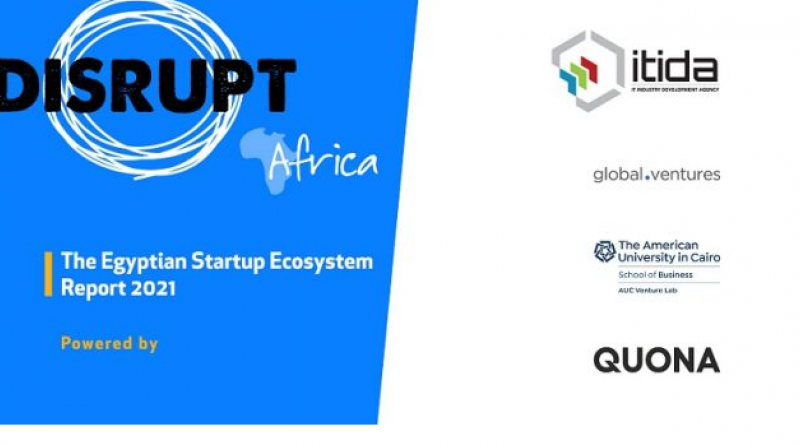New report tracks emergence of Egypt as African tech startup powerhouse

Substantial increases in startup activity and a massive inflow of capital has seen the Egyptian startup ecosystem establish itself as one of Africa’s “big four” within a relatively short period of time, with the sector’s development aided by proactive government and a strong local startup support system.
That is according to the newly-released Egyptian Startup Ecosystem Report 2021 from Disrupt Africa, which dives into the local ecosystem by analysing active startups, local support networks, and funding and exit activity over the last seven years.
Since launching its research arm in 2016, Disrupt Africa has built up a significant portfolio of publications, most notably the African Tech Startups Funding Report and Finnovating for Africa, previously available for sale but now made available free for all via open-sourcing initiatives with various partners across the continent’s tech ecosystem.
The Egyptian Startup Ecosystem Report 2021 is the first geographically-focused publication released by the company, made possible by support from key partners the Information Technology Industry Development Agency (ITIDA) and Global Ventures. Other supporters of the report are AUC Venture Lab (V-Lab) and Quona Capital.
The publication finds that at least 562 tech startups were in operation across Egypt as of September 2021, making it the fourth largest startup ecosystem on the continent, behind only South Africa, Nigeria and Kenya. These startups employ almost 13,000 people between them.
E-commerce is the most populated sector, with one-fifth of the country’s tech startups active in that vertical. Indeed, there are almost twice as many e-commerce and retail-tech startups as there are fintech ones, which came in second. Startups are active across a diverse array of spaces, with e-health, ed-tech, logistics, recruitment and AI/IoT also especially busy.
Almost 40 per cent of Egyptian tech startups have undergone some form of acceleration or incubation, an impressive statistic and one that speaks favourably to a local support ecosystem that also incorporates government, corporates and universities.
Increasingly, these startups are also supported by a strong investment ecosystem. At least 318 Egyptian startups have raised almost US$800 million since 2015, according to the report, and capital inflow into the ecosystem has been growing year-on-year. The US$156,248,000 raised in 2020 represents a 1,716 per cent increase on the US$8.6 million banked in 2015, and 2021 looks set to shatter all records. So far, more than 80 Egyptian startups have secured more than US$400 million between them this year.
“Egypt has truly emerged as a tech powerhouse for Africa, and now rivals – and even surpasses – more established startup ecosystems such as South Africa, Nigeria and Kenya for levels of entrepreneurial innovation and investment. Disrupt Africa is delighted to release its first country-focused report with Egypt as its subject, and thanks its partners for making it free to all,” said Tom Jackson, co-founder of Disrupt Africa.
“In the interest of building bridges between Egypt and the wider continent, the report also looks at a new trend, whereby Egyptian startups are expanding their businesses into Sub-Saharan Africa. Whereas historically Middle Eastern markets would have been more obvious destinations for expansion, more and more Egyptian companies are seeing opportunities in the rest of Africa, and more Africa-focused investors are putting money into Egypt. These are very positive developments,” said Gabriella Mulligan, co-founder of Disrupt Africa.
“As capital allocators, our investment decision-making process is guided by data and market insight. Yet, in the nascent ecosystem of emerging markets, information is not always readily available. Disrupt Africa is stepping in to fill in this gap, and we are thrilled to partner with them for this report on a market we are continuously and exceedingly excited about,” said Basil Moftah, general partner at Global Ventures.
“For the past five years, AUC Venture Lab’s Fintech Accelerator has been committed to enabling fintech entrepreneurs and empowering them with the knowledge and networking opportunities they really need. We are gladly supporting the fintech section of Disrupt Africa’s Egyptian Startup Ecosystem Report as it offers insights for anyone looking for information about the space and its key players and the growing ecosystem at large,” said Dr Ayman Ismail, AUC’s Abdul Latif Jameel Endowed Chair of Entrepreneurship and AUC V-Lab Director.
“Advanced technology, a rapidly growing economy, and smart regulation have attracted Quona to Egypt as an investor, but access to information is critical for innovation,” says Monica Brand Engel, co-founder and managing partner at Quona Capital, who focuses on the firm’s Africa and MENA investments in fintech and embedded finance. “We are proud to be a partner of this inaugural report from Disrupt Africa, in the hopes that it will spur even more fintech and embedded finance growth in Egypt.”
As with this year’s African Tech Startups Funding Report 2021, which has been downloaded almost 4,000 times, and Finnovating for Africa 2021, released in June and already downloaded 2,000 times, the Egyptian Startup Ecosystem Report 2021 is available to all for free, making the data and analysis contained in its pages accessible to those for whom the information is most valuable – entrepreneurs.
For more information or to download the report please visit this page or email Gabriella on gabriella@disrupt-africa.com, or Tom on tom@disrupt-africa.com.
25 October 2021
disrupt-africa






